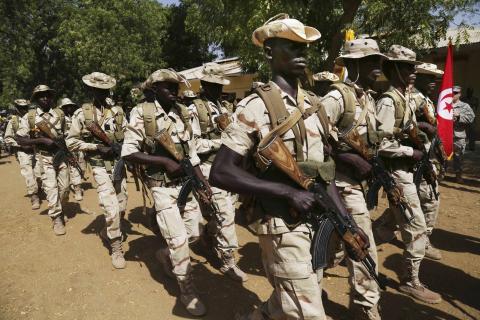Advertisement
African allies aim to pin down Boko Haram till March offensive: Niger
N'DJAMENA (Reuters) - Niger, Chad and Cameroon are seeking to pin down Boko Haram within Nigeria's borders ahead of a ground-and-air offensive by a regional task-force due to start from the end of next month, a senior Niger military official told Reuters.
The Islamist group, which has killed thousands of people in a six-year insurgency in Nigeria, has fought fierce battles with the three countries' armies in southern Niger and northern Cameroon, near Nigeria's borders, in recent weeks.
Chadian forces have made incursions into Nigeria to push back the jihadist fighters, hundreds of whom have been killed.
Military chiefs will meet in the Chadian capital N'Djamena next week to finalise strategy for the 8,700-strong task-force of troops from Chad, Cameroon, Nigeria, Benin and Niger, said Colonel Mahamane Laminou Sani, director of documentation and military intelligence of Niger's armed forces.
"All we are doing right now is stopping Boko Haram from entering Niger: if they attack our positions we push them back a certain distance and Nigeria pushes from the other side to contain the situation," he said, on the sidelines of the annual U.S.-sponsored 'Flintlock' counter-terrorism exercises in Chad.
"There are initiatives by our countries to make sure Boko Haram doesn't get out of control, but we have a deadline of end-March to put the joint force into practice," he told Reuters late on Wednesday.
Highlighting the cross-border threat, militants attacked Niger overnight, killing three before they were driven back.
The force's first commander will be a Nigerian and the position will then rotate annually among members, Sani said.
The implementation of the force has been delayed by tensions between Nigeria and Cameroon over the right to pursue militants across the border into each other's countries, sources said.
Niger and Chad already have agreements in place covering that with each other and with Nigeria. Nigeria and Cameroon will be under pressure to iron out their differences.
"This should be the last meeting, I think. We don’t have any choice," Sani said. "If we don’t go to find Boko Haram, they are going to come and find us."
US INTEL SUPPORT
Niger's military has carried out air strikes against Boko Haram positions and used ground forces to mop up the survivors, Sani said.
Sahelien.com, a regional news website, reported raids by Niger's troops who entered the Nigerian town of Marara on Feb. 15 and air strikes on Damasak on Feb. 16. A security source said the reports were accurate but gave no further details.
Sani denied the Niger air force was responsible for an attack on Tuesday that killed at least 36 civilians at a funeral in the border village of Abadam.
A local mayor said he believed a Nigerian military plane was responsible. Nigeria has denied this and Niger has said it is investigating.
Air power will play a key role but ground troops will then used to neutralise survivors in the wooded and mountainous terrain occupied by the Sunni jihadist group, Sani said
"Information on their location needs to come from human sources first, then you send technological resources to check it, and you maintain observation on them until air strikes arrive," he said.
Asked whether the U.S. military could help with drone intelligence on fighters' movements, he said: "That is already a reality. They help us in that sense."
"This is no longer a issue of national security for Nigeria, it’s a question of regional and international security," he said. "If Nigeria implodes then the whole of Africa will feel it."
(Editing by David Lewis, Matthew Mpoke Bigg, Kevin Liffey and Giles Elgood)



















Add new comment